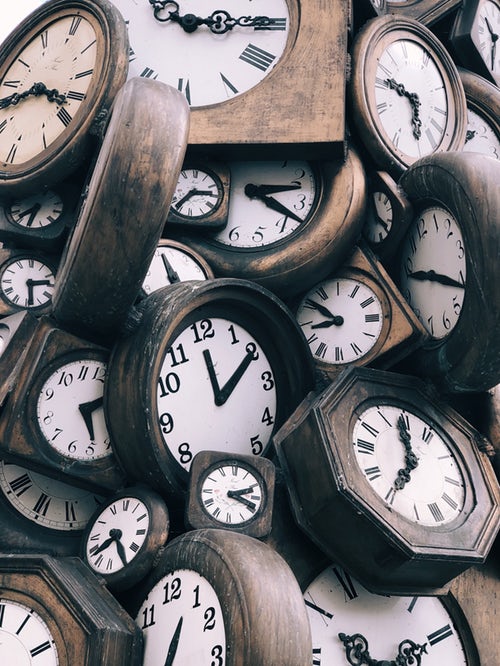Have you ever grieved the death of a beloved family member or friend? It shatters your heart, implodes your world , sucks the air out of life, and disorders your brain. You get inhaled into that swirling vacuum of denial, anger, bargaining, depression and acceptance—the classic 5 stages of grief. (Some psychologists even make it 7 stages, with the addition of shock at the onset and then testing after depression.)
Cancer patients and others who receive devastating chronic illness diagnoses become familiar with them.
Even people suffering through a relationship break-up can experience these stages.
And the loss of a beloved pet can break your heart and unbalance your life.
Another type of grief—
But there’s another type of loss that’s hitting home for me right now, one that’s triggering all of these stages too.
The loss of probably the most precious commodity any of us have.
Time.
Time lost, although I’m not sure how you can actually lose time since it’s not something you can gather up and store. But I understand why people say they’ve lost time. It just feels as though something you thought you controlled sifted right through your fingers like water.
Then there’s time wasted.
Time stolen.
Time we’ve let others steal from us, because we couldn’t, or wouldn’t, say no to their time-wasting plans or demands.
Time you try to manage. (Now there’s an elusive idea.)
Time you need.
Like time to grow and time to heal.
Have you ever wondered why you had to put up with so much during a season of your life and fervently prayed to get out of it, only to discover later that God was working behind the scenes, preparing you for something grander. Something you wouldn’t have been able to do if you hadn’t slogged through that difficult time?
I’ve experienced plenty of those. I’ve watched my beloved go through that type of thing several times in his career. Once the good, productive fruit starts to emerge, it’s easy to look back with hindsight and point to the preparation.
Post-injury and post-surgery healing can feel like that—a big waste of time that only carved an empty, fruitless hole in your life.
How much better it would be if we’d just slog along joyfully and expectantly, knowing God has His hand in everything in our lives and always knows best. Why can’t we be more willing participants?
Experience—
When I was pregnant with my younger son, I was confined to bed. Completely. Tilted 15 degrees head down. Every. Single. Day was critical to my unborn baby’s development. Every. Single. Day was a practice of supreme patience and personal surrender in the face of abject fear.
“Four months is a small period of life,” my gentle doctor said. To me it seemed like eternity.
To Cory—my developing son—it meant life or death.
Thankfully, I made it three months, and we were rewarded with life. Only because God gave us a miracle.
Two entirely different views of time, with one result.
And now, 24 years later, I’m puttering around thinking about time and realizing I’m a slave to it. A slave to the time it takes to heal from yet another surgery, even though I wasn’t fully healed from the last one in November. Some people keep telling me “healing takes time,” which I know because I have a degree in helping people heal; and weary of others who think I should be healing faster, either because they did following their similar surgery, or because they think I’m protecting myself too much.
Actually, both admonitions are right: healing does take time; and you have to stress yourself to heal. It’s a fine balance of both.
Are you old enough to remember when doctors sent back-injury patients to bed rest for weeks? That advice didn’t work very well. They need to be up and moving, as long as they aren’t doing any further harm to their injury. Even open heart surgery patients are extracted from their beds and made to shuffle around the hospital corridors within 3 days of surgery. Controlled, appropriate stress makes the system rebuild and heal.
A bedridden patient experiences severe and rapid muscle atrophy. Strength and balance are lost and compromised. Often, it’s impossible to correct that kind of damage.
And that’s the key. A delicate balance between stress and rest.
The danger of time—
But the biggest problem I’m having is that I have way too much time on my hands and fritter it away by allowing my brain to backtrack down memory lane and assail me for all the time I wasted, the time I didn’t choose to do the best thing, the time I missed out because I was too lazy or fearful or paralyzed into inaction.
I spend too much time dwelling on those memories, romancing what wasn’t and maybe could have been, and turning them into idols. All that memory work is making my heart sick. And that’s affecting my healing.
Scripture to the rescue!
The passage from the epistle that St. Paul wrote to the Ephesians is repeating itself in my mind. Two different versions put it this way:
“…making the most of your time, because the days are evil” (NASB; italics mine).
“…making the most of every opportunity, because the days are evil” (NIV; italics mine).
And then there’s the passage Paul wrote in 2 Corinthians:
“…we take captive every thought to make it obedient to Christ.”
Letting my mind wander backward down memory lane, and allowing myself to let others’ opinions (or my own warped ones) about how slowly or quickly I should be recovering are unproductive. They only promote dangerous self-guessing, depression, frustration and grief. Depression, frustration and grief that get added to the depression, frustration and grief one normally experiences post-injury or surgery.
Depression, frustration and grief heaped on depression, frustration and grief.
Now there’s a real waste of time and life resources.
Change of direction, and thinking—
While I may need to formally grieve those lost opportunities and failed moments at some point in the future, right now I need to resist allowing them to suck the energy out of what I need to be doing at this moment: taking the limited energy I do have and focusing it on healing and whatever else God lays on my heart to do.
On a daily basis, that might not be much and end up appearing pretty measly—between the physical therapy, re-conditioning workouts, and obligatory naps with elevated and iced knee. And that’s okay. I need to be satisfied with it, thank God for it, and be grateful.
Right now it’s all about focus. I’m having to put on blinders and double down on mine.
At some time in the future, I know the good fruit will emerge. And when it does, I’ll be jubilant!
How about you?
Are you experiencing a time of recovery, where frustration and depression threaten the outcome of your healing?
While it can be a day-to-day emotional and physical struggle, it can also be one of the sweetest times in your life. Time you saturate yourself in God-time. (Can you tell I’m preaching to myself too?) Pruning time. Nurturing time. A time when God is never so close, because it’s a time we are more acutely aware of His presence.
Don’t overlook it. Don’t grieve it. Don’t waste it. Make no apologies for taking it.
As my friends tell me, healing takes time.
However long that is for you.
But it also takes energy and work.
Thank God for the process!
Until next week,
Shalom!
Andrea
“Certainly there was an Eden….We all long for it, and we are constantly glimpsing it.” —J.R.R. Tolkien



